Key takeaways:
- Intermittent fasting (IF) is an eating pattern focusing on when to eat rather than what, allowing for mindful food enjoyment.
- Benefits include improved energy levels, metabolic health, and a transformed relationship with food, leading to more thoughtful eating experiences.
- Challenges include managing hunger, social situations, and maintaining mental focus during fasting periods.
- Successful fasting involves hydration, choosing a suitable eating window, and being flexible to adjust based on physical and emotional needs.
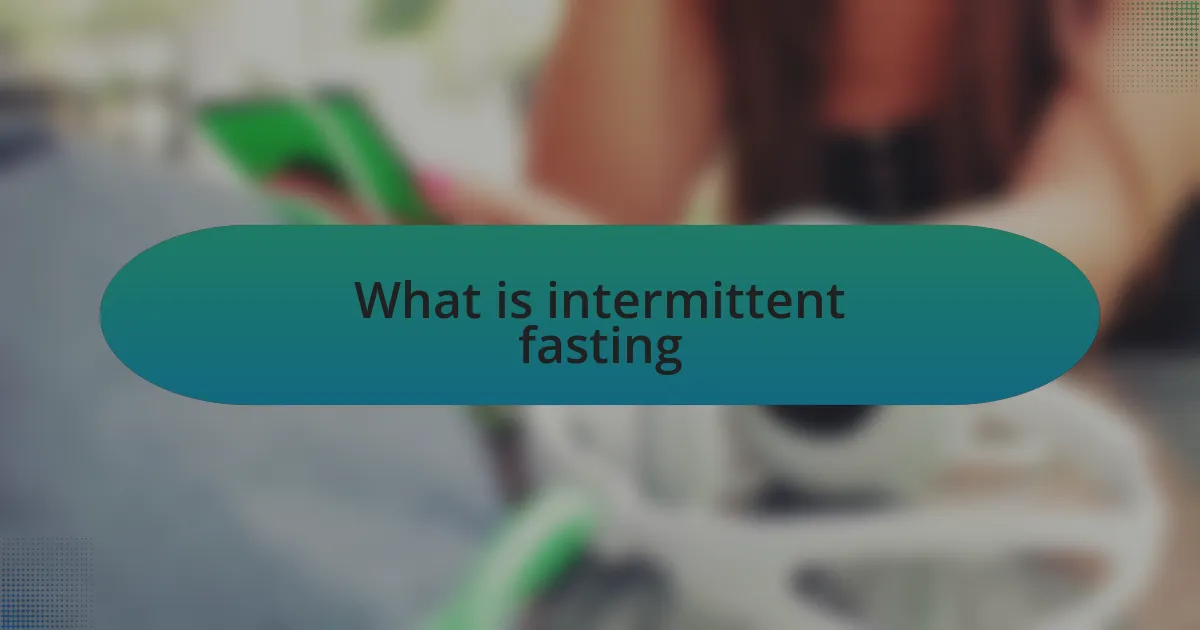
What is intermittent fasting
Intermittent fasting (IF) is an eating pattern that alternates between periods of fasting and eating. I remember the first time I tried it; I was intrigued by the simplicity of just choosing when to eat rather than obsessing over what to eat. This approach transforms how we view food—not as a constant necessity, but as something we can enjoy more mindfully.
In practice, there are various methods of intermittent fasting, such as the 16/8 method, where you fast for 16 hours and eat during an 8-hour window. I often wondered how my body would respond to such a schedule, and during my first week, I felt lighter and more energetic. Have you ever experienced that clarity that comes from not being distracted by constant snacking?
Beyond weight management, the appeal of intermittent fasting lies in its potential health benefits, including improved metabolic health and brain function. I found it fascinating how this practice could potentially reduce inflammation and promote cellular repair. It made me think about how our historical ancestors ate and how their natural rhythms might have shaped their health.
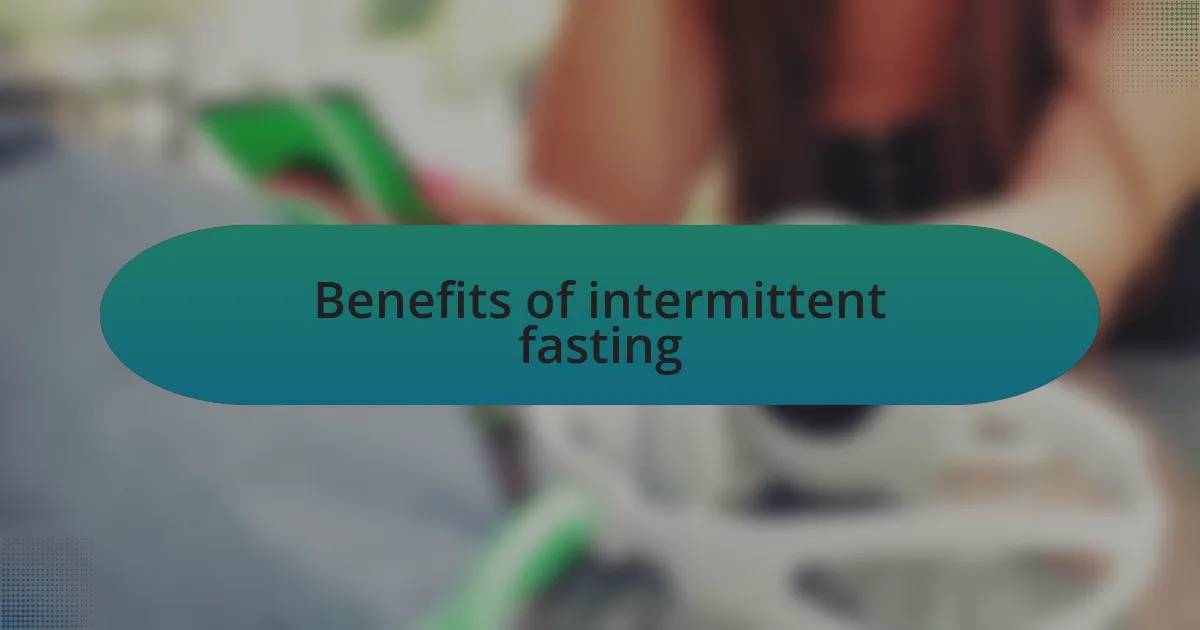
Benefits of intermittent fasting
The benefits of intermittent fasting are quite remarkable. When I first committed to it, I noticed not just my waistline shrinking, but also my energy levels surging. Have you ever experienced that heightened sense of awareness that comes when you’re focused, rather than weighed down by food? This clarity is something I’ve grown to cherish during my fasting periods.
Another significant benefit I discovered was the impact on my metabolism. When I began fasting, I read about how it can help improve insulin sensitivity. Seeing my energy levels stabilize throughout the day was a game-changer for me. I felt like my body was functioning more efficiently, and I couldn’t help but wonder how long I had been eating too frequently without realizing it.
Moreover, intermittent fasting sparked a change in how I approached my cravings. Initially, I was concerned about feeling deprived, yet I found the opposite to be true. Embracing these fasting windows taught me to appreciate my meals much more deeply—every bite felt like a celebration rather than an obligation. Have you ever had a moment when food transformed from just sustenance into something you truly savor? This shift in perspective is one of the most profound rewards of intermittent fasting for me.
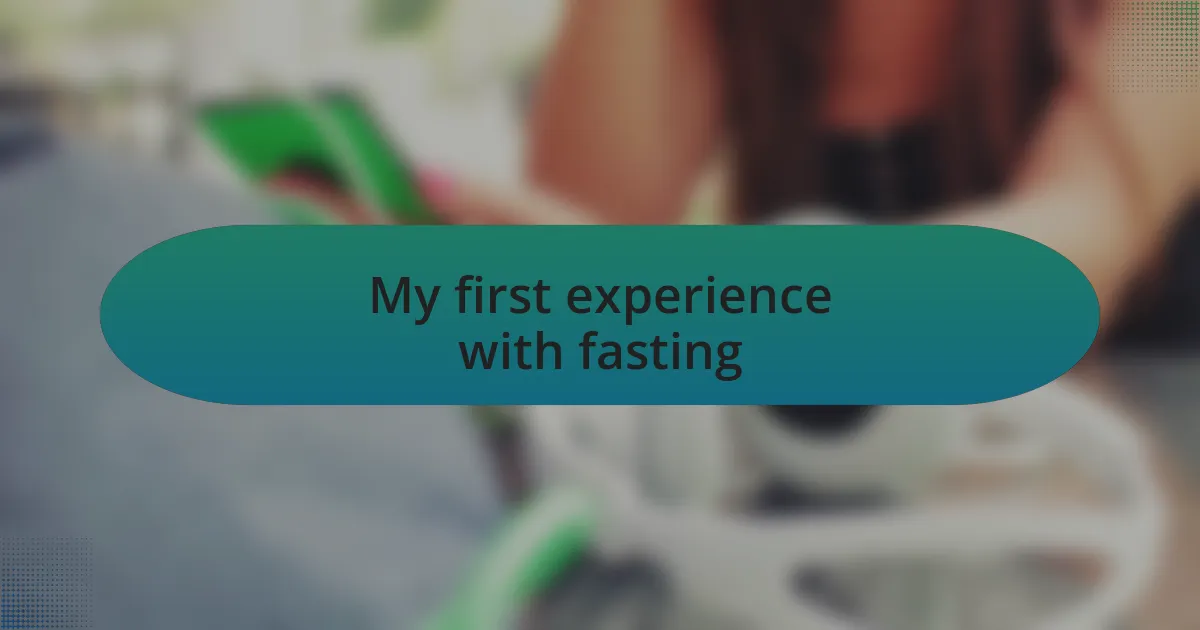
My first experience with fasting
My first experience with fasting was both daunting and enlightening. I remember sitting at the table, staring at the clock, and wondering if I could really go an entire day without food. The initial hours felt like an eternity, but I soon discovered a surprising clarity in my thoughts that I had never anticipated. Have you ever been struck by the realization that hunger can lead you to a place of deeper awareness?
As the hours progressed, I found myself reflecting on my relationship with food. Prior to fasting, I’d often eat out of habit rather than hunger. This experience helped me confront those mindless eating patterns. By the time I reached my first set eating window, the first bite of my meal was filled with so much gratitude. I could almost hear a voice within me saying, “You’ve earned this,” and that made the food taste infinitely richer.
I cannot help but smile when I think back to that day. The experience wasn’t just about physical changes; it was a profound shift in mindset. Looking back, I wonder: how many of us are walking around feasting mindlessly? For me, fasting opened a door to mindfulness and appreciation that I never knew was possible. That first day was just the beginning of a journey that reshaped my view on food and nourishing my body.
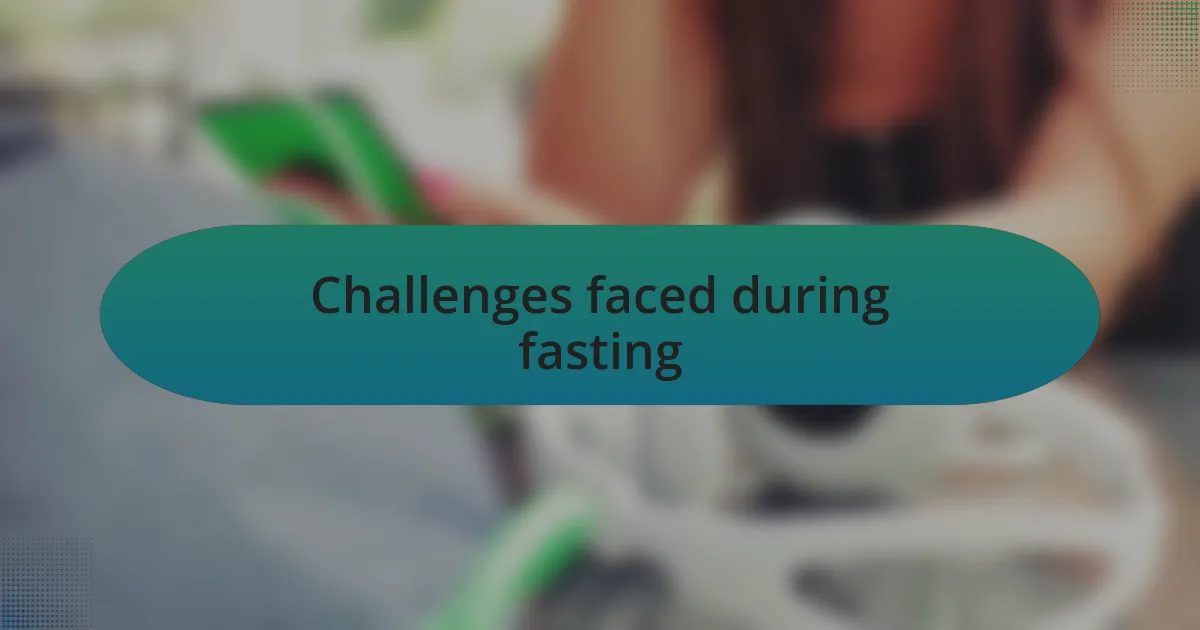
Challenges faced during fasting
As I dove deeper into intermittent fasting, I encountered some tough moments that tested my resolve. There were days when the hunger pangs felt like they were echoing through my entire body, especially during the late afternoon slump when my energy dipped. Has that ever happened to you? The combination of fatigue and hunger left me feeling irritable, and I questioned whether this practice was truly worth it.
Another challenge was the social aspect of dining. I vividly recall attending a friend’s birthday party where food was abundant and inviting. Everyone around me was enjoying a feast, and I was left sipping water, trying to ignore the tempting smells wafting through the air. It made me wonder: how do you balance social obligations with a fasting schedule?
The mental battle was just as significant. I often found myself grappling with thoughts of food during my fasting periods, imagining all the meals I wanted to indulge in. Breaking that cycle of constant craving required mental strength. I had to remind myself that the experience was teaching me patience and resilience, repetition that ultimately became a vital part of my growth.
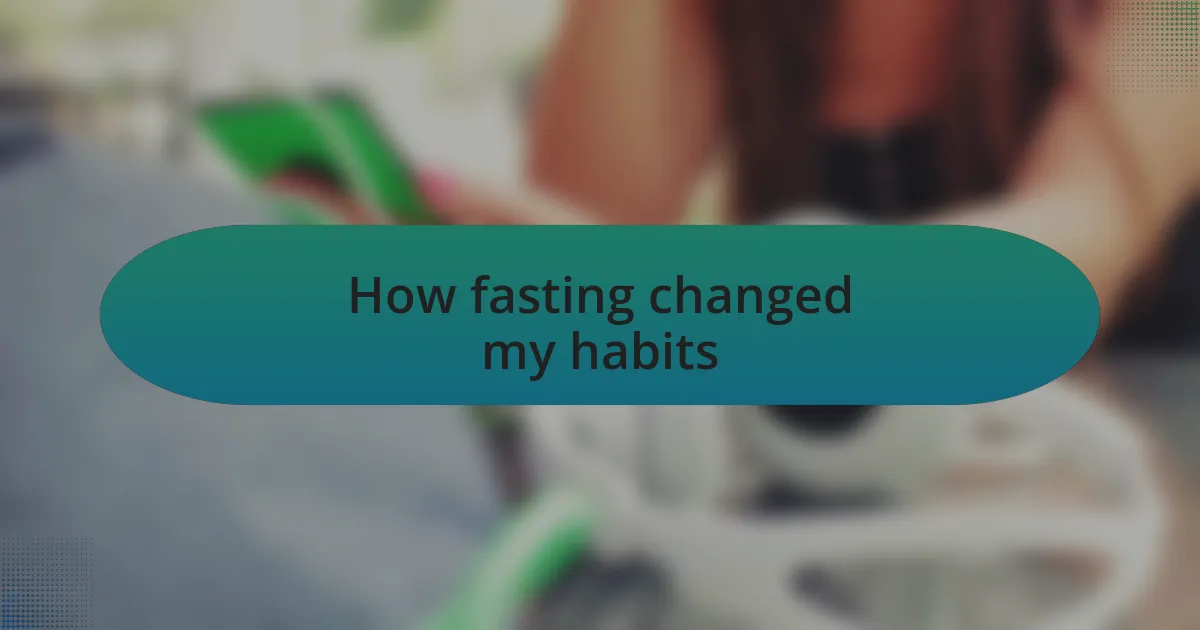
How fasting changed my habits
The journey of fasting transformed not just my meal patterns, but also my entire outlook on eating. I remember the first time I successfully completed a 16-hour fast; it felt empowering to realize I didn’t need to reach for food every time I felt a little hungry. This change instilled a newfound sense of discipline in my daily routine, making me more mindful about what I consumed and when.
Over time, as my cravings began to wane, I noticed a significant shift in my relationship with food. Instead of seeing it as a source of comfort or distraction, I started to appreciate it for its nutritional value. This was an eye-opener for me; have you ever thought about how much you eat out of sheer habit rather than genuine hunger? I began to ask myself that question frequently, leading me to make smarter choices aligned with my body’s actual needs.
Ultimately, fasting helped me develop a heightened sense of self-awareness. During my fasting periods, I found clarity in my thoughts, enabling me to focus on tasks without the usual food-related interruptions. I can still vividly recall spending an entire afternoon writing, completely immersed in my thoughts, free from any cravings — a feeling I never thought would be possible. Is it surprising how much mental space we free up when we change our eating habits? For me, it was nothing short of revolutionary.
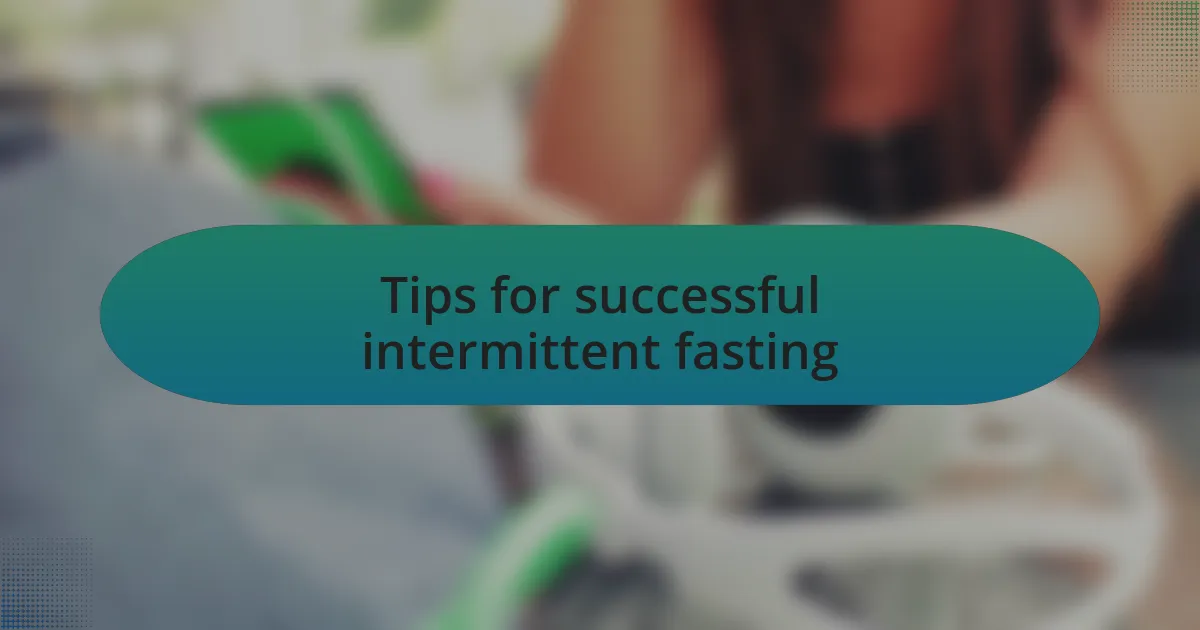
Tips for successful intermittent fasting
Staying hydrated during fasting is crucial for success. Water, herbal teas, and black coffee can help curb hunger pangs while keeping you energized. I remember those early days when I struggled with the temptation to snack; having a cup of herbal tea close by made all the difference. Have you tried it?
Another important tip is to choose the right eating window that suits your lifestyle. When I first began, I opted for an 8-hour window that aligned with my daily schedule. This made it easier for me to stick to my routine without feeling deprived. Consider what works best for you; what time of day do you feel most comfortable eating?
Lastly, listen to your body. There were days when I felt too fatigued to stick to my fasting schedule. I learned that it’s okay to adjust my approach based on how I felt physically and emotionally. The flexibility I allowed myself created a more sustainable practice. Isn’t it more rewarding to make changes that fit your life rather than forcing a rigid plan?